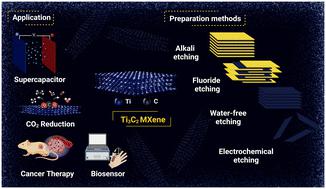当前位置:
X-MOL 学术
›
Environ. Sci.: Nano
›
论文详情
Our official English website, www.x-mol.net, welcomes your
feedback! (Note: you will need to create a separate account there.)
2D MXene nanocomposites: electrochemical and biomedical applications
Environmental Science: Nano ( IF 5.8 ) Pub Date : 2022-09-28 , DOI: 10.1039/d2en00527a Marzieh Ramezani Farani 1 , Behnam Nourmohammadi Khiarak 2 , Rui Tao 3 , Zegao Wang 3 , Sepideh Ahmadi 4, 5 , Mahnaz Hassanpour 6 , Mohammad Rabiee 7 , Mohammad Reza Saeb 8 , Eder C. Lima 9 , Navid Rabiee 10, 11
Environmental Science: Nano ( IF 5.8 ) Pub Date : 2022-09-28 , DOI: 10.1039/d2en00527a Marzieh Ramezani Farani 1 , Behnam Nourmohammadi Khiarak 2 , Rui Tao 3 , Zegao Wang 3 , Sepideh Ahmadi 4, 5 , Mahnaz Hassanpour 6 , Mohammad Rabiee 7 , Mohammad Reza Saeb 8 , Eder C. Lima 9 , Navid Rabiee 10, 11
Affiliation

|
In recent years, key questions about the interaction of 2D MXene nanomaterials in electrochemical and biomedical applications have been raised. Most research has focused on clarifying the exclusive properties of the materials; however, only limited reports have described the biomedical applications of 2D nanomaterials. 2D MXenes are monolayer atomic nanosheets resulting from MAX phase ceramics. The hydrophilic properties, metallic conductivity, stability, and exclusive physiochemical performances make them promising materials for electrochemical and biomedical applications, including CO2 reduction, H2 evolution, energy conversion and storage, supercapacitors, stimuli-responsive drug delivery systems, regenerative medicine, and photothermal cancer therapy. In this review paper, we have provided facile approaches to synthesising MXene and characterization of chemical and physical properties. Their potential applications in medicine, ranging from antibacterial agents to targeted drug delivery, cancer photo/chemotherapy, tissue engineering, and electrochemical applications, have not been comprehensively reviewed and discussed—which encouraged us to come up with this work. We also discuss the most common challenges of utilizing MXene-related materials and areas that can be further developed in the future, with possible struggles and limitations one may face.
中文翻译:

2D MXene 纳米复合材料:电化学和生物医学应用
近年来,人们提出了关于二维 MXene 纳米材料在电化学和生物医学应用中相互作用的关键问题。大多数研究都集中在阐明材料的专有特性上。然而,只有有限的报道描述了二维纳米材料的生物医学应用。2D MXene 是由 MAX 相陶瓷制成的单层原子纳米片。亲水性、金属导电性、稳定性和独特的理化性能使其成为电化学和生物医学应用的有前途的材料,包括 CO 2还原、H 2进化、能量转换和储存、超级电容器、刺激响应药物输送系统、再生医学和光热癌症治疗。在这篇综述论文中,我们提供了合成 MXene 和表征化学和物理特性的简便方法。它们在医学中的潜在应用,从抗菌剂到靶向给药、癌症光/化学疗法、组织工程和电化学应用,尚未得到全面审查和讨论——这鼓励了我们提出这项工作。我们还讨论了使用 MXene 相关材料的最常见挑战以及未来可以进一步开发的领域,以及可能面临的困难和限制。
更新日期:2022-09-28
中文翻译:

2D MXene 纳米复合材料:电化学和生物医学应用
近年来,人们提出了关于二维 MXene 纳米材料在电化学和生物医学应用中相互作用的关键问题。大多数研究都集中在阐明材料的专有特性上。然而,只有有限的报道描述了二维纳米材料的生物医学应用。2D MXene 是由 MAX 相陶瓷制成的单层原子纳米片。亲水性、金属导电性、稳定性和独特的理化性能使其成为电化学和生物医学应用的有前途的材料,包括 CO 2还原、H 2进化、能量转换和储存、超级电容器、刺激响应药物输送系统、再生医学和光热癌症治疗。在这篇综述论文中,我们提供了合成 MXene 和表征化学和物理特性的简便方法。它们在医学中的潜在应用,从抗菌剂到靶向给药、癌症光/化学疗法、组织工程和电化学应用,尚未得到全面审查和讨论——这鼓励了我们提出这项工作。我们还讨论了使用 MXene 相关材料的最常见挑战以及未来可以进一步开发的领域,以及可能面临的困难和限制。











































 京公网安备 11010802027423号
京公网安备 11010802027423号